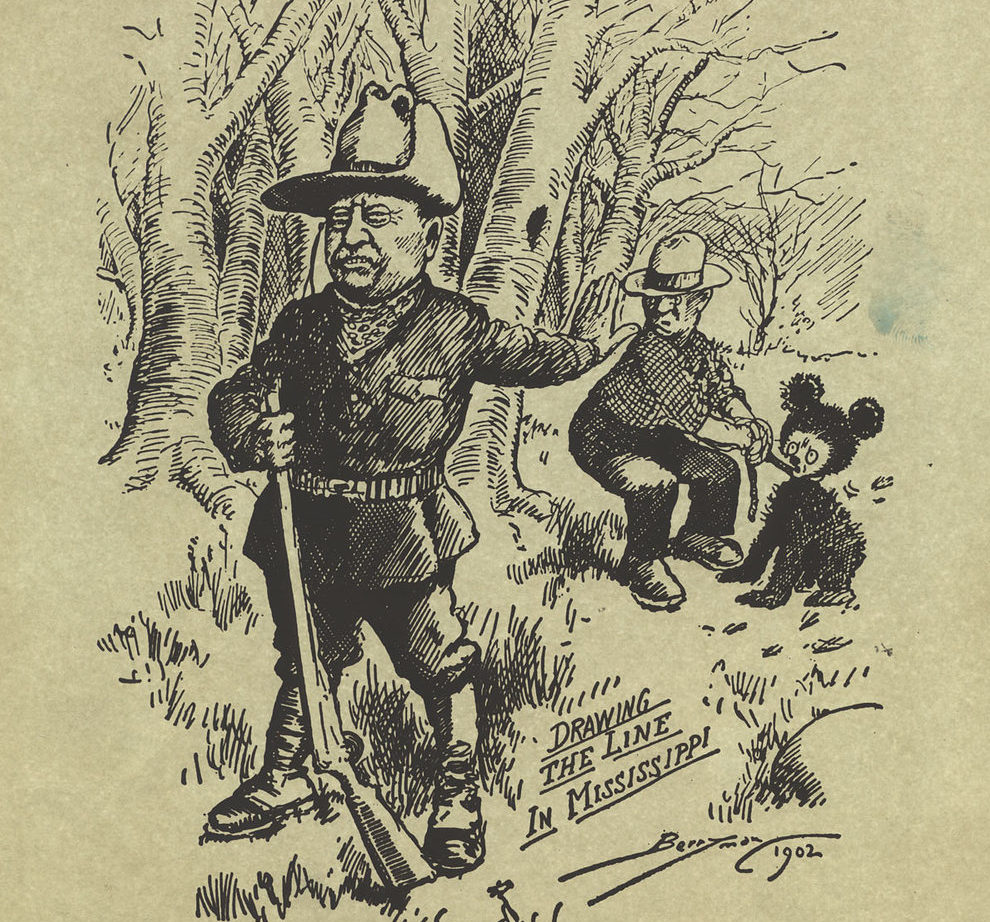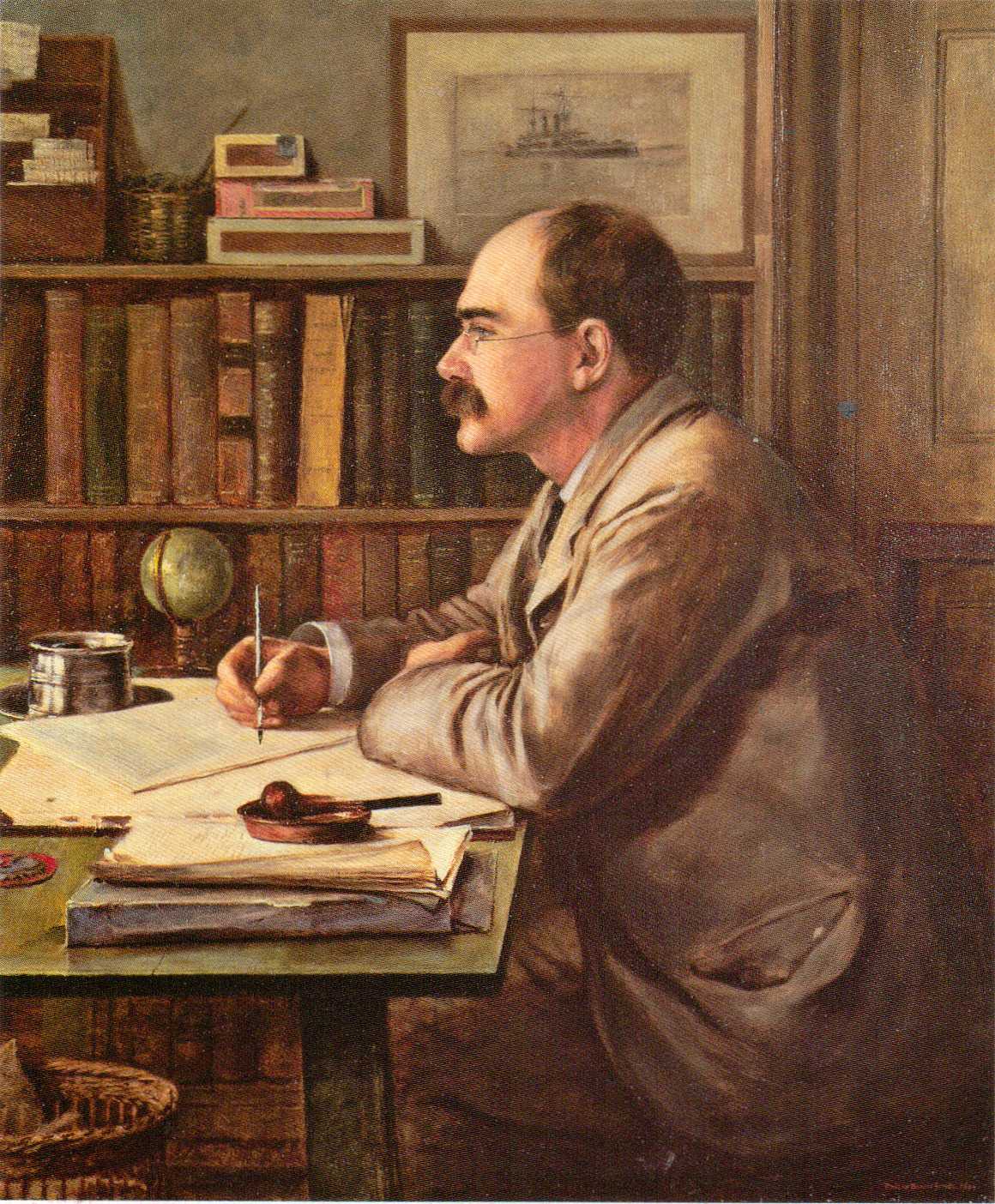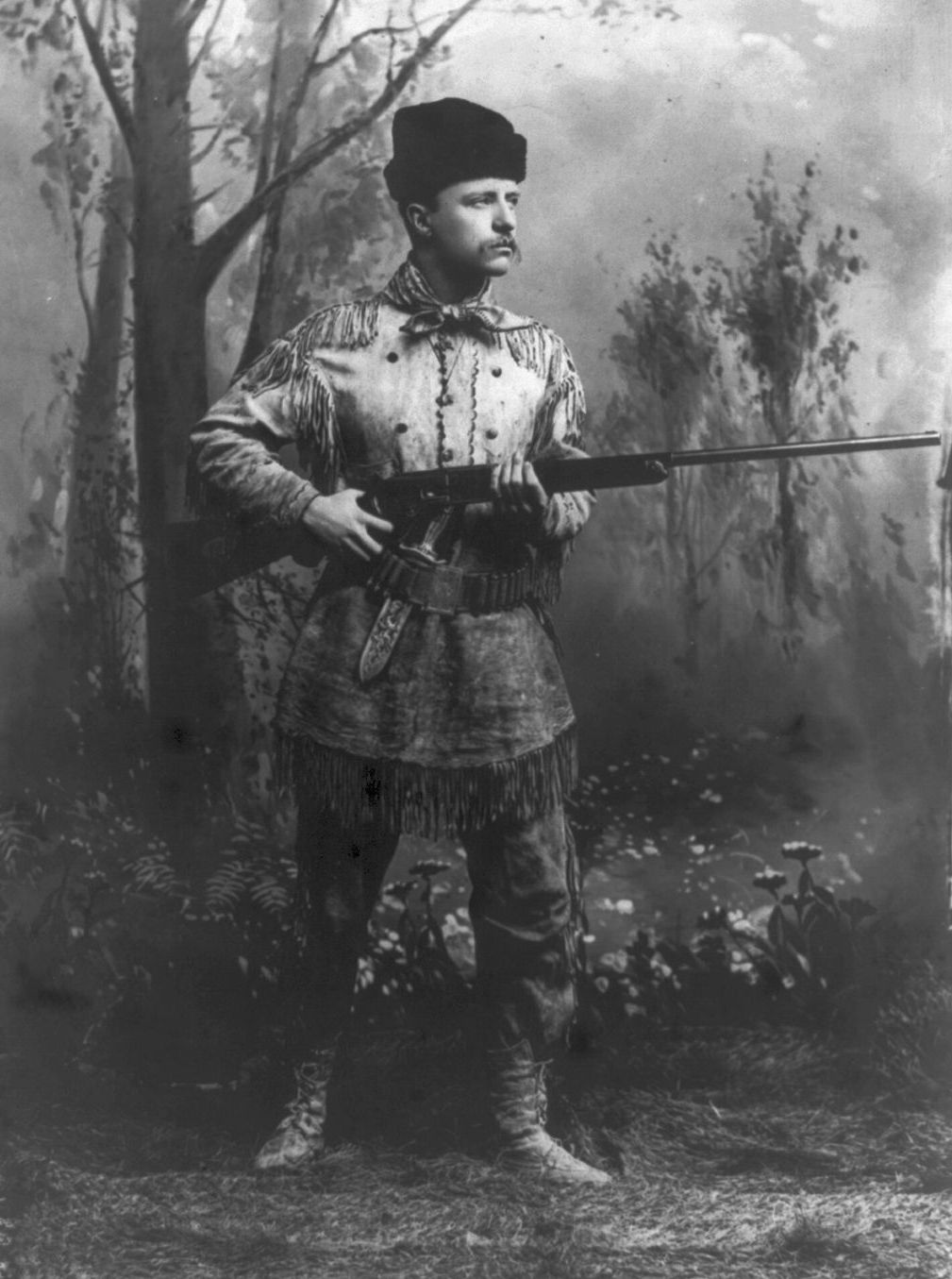Is America an Empire? Should it be? Indications of mission creep in the Middle East and proposals for a Cold War–like buildup of heavy weaponry in the Baltic states have renewed misgivings about American power and overreach—“Are we Rome?” Such anxieties are countered by dire predictions that China, Iran (emboldened by a nuclear deal), Russia, or even the Islamic State will fill the imperial void created by any lessening of American resolve. Amid such contention, I’ve found myself thinking about Rudyard Kipling and Teddy Roosevelt. During the spring of 1895, these two celebrants of empire became close friends over a series of visits they made to the Washington Zoo; around this time, they also seem to have developed contrasting views about the supposed work of empire—views that I have come to think of as Kipling’s beaver vs. Roosevelt’s bear.
Kipling won the Nobel Prize for Literature in 1907, when he was probably the most successful writer in the world. Some of his work remains popular, of course. Two movie versions of The Jungle Book are reportedly in production. “If—” was recently voted England’s favorite poem. Kipling’s reputation has slipped, however, as he has come to be regarded, increasingly, as the Poet of Empire—most notoriously in his poem “The White Man’s Burden,” first published in February 1899.
The occasion for the poem was the American liberation of the Philippines during the Spanish-American War. The question facing the United States, which has always claimed that it has no interest in maintaining an empire, was what to do about the Philippines: leave it to the Filipinos or occupy it for what we now call nation-building? By 1899, Kipling was sufficiently familiar with the United States that he felt entitled to offer advice. He had married an American named Carrie Balestier in 1892, and they spent four happy years on a farm outside Brattleboro. Ruddy (as family members called him) wrote The Jungle Book in Vermont as well as his American novel, Captains Courageous.
Kipling believed that it was time for the “Anglo-Saxon” United States to take up its share of the “burden” of empire, then carried by Great Britain:
Take up the White Man’s burden—
Send forth the best ye breed—
Go bind your sons to exile
To serve your captives’ need…
Kipling sent the poem to Theodore Roosevelt, who deemed it “good sense from the expansionist standpoint” but “rather poor poetry.” The day after the poem appeared, the Senate voted as Kipling advised, to occupy the Philippines, with disastrous results.
The title of the poem is clearly racist, and one would prefer that Kipling had not referred to the Filipinos as “your new-caught, sullen peoples,” as though the American army was in the business of trapping wild game. And yet, the challenge Kipling envisions for the technologically advanced nations—of introducing modern medicine, sanitation, and transportation to those less fortunate—is precisely the task that the United States has long adopted. It is the ethos of the World Bank and UNICEF. If you changed a few words and renamed the poem “The Burden of the Developed World,” you might be describing some of the better intentions of the American Century.
Now, this is not how Teddy Roosevelt imagined the work of empire. For Roosevelt, the primary aim was territorial expansion through glorious war. It was Roosevelt who, as Assistant Secretary of the Navy, gave the order to attack Manila harbor in 1898. It was Roosevelt who resigned his naval post to lead his Rough Riders up San Juan Hill. During a dispute with Great Britain over colonial borders in South America in 1895, Roosevelt, characteristically, imagined that the United States might have an excuse to annex Canada. “I shall try to have a hand in it myself,” he said.
What I want to suggest is that these opposing views of empire—as public service and as territorial conquest—were partially established several years earlier, and in unexpected circumstances, when Kipling and Roosevelt first became friends. In early 1895, Kipling’s wife, Carrie, had burned her face in an accident with their unpredictable furnace in Vermont and Kipling thought that a few weeks in the warmer south might accelerate the healing. Kipling had friends in the capital, notably Henry Adams and John Hay, a distinguished diplomat. Adams and Hay cultivated a group of promising young men, including Cecil Spring Rice, a member of the British legation, and Roosevelt, who was at the time a Civil Service Commissioner. A popular destination for these leisured aristocrats was the newly established National Zoological Park, laid out by Frederick Law Olmsted along Rock Creek in northwest Washington.
Kipling was writing The Jungle Book, and the animals at the zoo confirmed details in the narrative, while suggesting fresh ideas for further stories. For his part, Roosevelt was a founding member of the Boone & Crockett Club, which took an interest in building zoos, regarding them essentially as wild game preserves by a different name. Established in 1887, the club was a coterie of wealthy big-game hunters who adopted an aristocratic code, known as the “Fair Chase Statement,” for the proper “taking” of animals. Members pledged to take their prey “in a manner that does not give the hunter an improper advantage.” The club also lobbied for the expansion of Yellowstone, the first National Park, and pushed through legislation in 1891 for the National Forests.
Advertisement
Roosevelt proudly took Kipling to the Washington Zoo on several occasions, and, according to Kipling, “talked about grizzlies that he had met.” Kipling wasn’t interested in bears, however, despite the kindly Baloo, Mowgli’s teacher in The Jungle Book. He much preferred the beavers. He also chided Roosevelt on American policy toward the Indians, wondering aloud how “a people who, having extirpated the aboriginals of their continent more completely than any modern race had ever done, honestly believed that they were a godly little New England community.” At the Smithsonian, Kipling wrote, Roosevelt “made the glass cases of the Indian relics shake with his rebuttals.”
Kipling had first encountered beavers, long extinct in Europe, during his 1889 journey across the American continent, when he joined a party of tourists on a trail ride along the Firehole River, in Yellowstone, to visit a beaver-lodge. “There is only one thing more startling than the noiselessness of a tiger in the jungle,” he wrote, “and that is the noiselessness of a beaver in the water.”
“It cheers me to think I have seen the beaver in his wilds,” Kipling wrote of his visit to Yellowstone. “Never will I go to the Zoo.” Five years later, he was going there repeatedly, and specifically to observe the beavers, admiring their work ethic, their building of colonies, their mating for life. His dream was to reintroduce the beaver to the wetlands of Vermont, where they had died out by the 1850s, victims of deforestation and the lucrative fur trade.
“I’m loaded up with facts about beaver,” Kipling wrote. But a month later, he was already discouraged. Kipling evidently wanted an enclosure for his Vermont beavers, a little private zoo of his own, rather than allowing the beavers to increase and multiply, up and down the banks of the Connecticut River. “It’s beyond my means” to create a beaver habitat, he wrote, “because unless you sink sheet iron or concrete five feet below ground the beaver will burrow out… but I can’t fence ten acres in that way.”
Fast forward to 1902. Theodore Roosevelt, by now in his first full year as president of the United States, had killed many different kinds of big game, many bears in particular, but never a Louisiana Black Bear. When the governor of Mississippi suggested a bear hunt in the Delta swamp led by the legendary guide Holt Collier, Roosevelt accepted. Collier knew the whereabouts of a mature bear. He placed Roosevelt in a blind and instructed him to wait for a clear shot. Then he took off with his forty dogs into the dense tangle of virgin oak and cypress. It took several hours to bring the bear to bay, at which point Collier drove the bear—a dangerous and delicate operation—toward the president’s blind.
But the president, impatient and hungry, had taken a break for lunch. Collier, disgusted—“I could have killed him a thousand times,” he said of the bear—adopted a more dangerous plan. With the dogs harassing the bear, he clubbed it, lassoed it, and dragged it, dazed, to a willow tree, where he tied it up. Then he went in search of the peckish president and invited him to shoot his bear. Roosevelt refused to shoot a bear tied to a tree. It went against everything that the Boone and Crockett Club stood for.
The cartoonist Clifford Berryman drew a cartoon for The Washington Post of reluctant Roosevelt, his Rough Rider hat on his head and his rifle butt on the ground, with the caption “Drawing the Line in Mississippi.” Instead of an old bear, Berryman drew a cute little black bear with big ears.
It was the cute bear cub that lived on. Morris Michtom, a Jewish shopkeeper in Brooklyn, designed a toy bear based on Berryman’s drawing and called it “Teddy’s Bear,” securing the president’s permission to market it, at $1.50 per bear. By 1938, when Michtom died, his Ideal Toy Company was selling more than 100,000 teddy bears a year. It seems a missed opportunity, in retrospect, that Michtom did not also make a stuffed beaver called Ruddy, with Kipling’s familiar round-rimmed glasses, his unmistakable bushy eyebrows, and his round, balding head.
Advertisement
We already know that the 2016 presidential campaign will involve a great deal of muscular talk about America restoring its leadership in world events, knocking some sense into Iran, pacifying Syria, and so on. Meanwhile (with much less fanfare), American forces were deployed to combat the Ebola outbreak in West Africa and to provide relief for earthquake victims in Katmandu. “Fill full the mouth of Famine/And bid the sickness cease.” What is to be the future of the American empire: the responsible beaver or the marauding bear?




